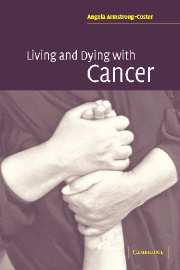3 - Stage Two – Exploration
Published online by Cambridge University Press: 22 September 2009
Summary
Tests and treatment
This chapter examines the events that occurred in the respondents' lives between learning their cancer diagnosis and becoming established in their treatment. This was a time marked initially with disbelief, uncertainty and fear. Accepting the diagnosis of cancer was not the respondent's only problem. Coming to terms with it was exacerbated by having to accommodate to a new routine filled with visits to surgeons, oncologists and radiographers, etc.
Learning they had cancer triggered a host of changes in their lives. Until now, their perceptions of the illness were second-hand, based on the accounts of others with the disease or by learning about it from the media. Elsewhere, I have described how:
… the initial weighing and prediction of how the disease will affect their lives is based on the myriad of information previously assimilated, however unconsciously, from a host of sources, not only from direct contact with others who have cancer but also from indirect sources which include the theatre (Duclow, 1981), literature (Guthke, 1999), art (Bertman, 1991; Guthke, 1999) and music (Neilson Chapman, 1997). (Armstrong-Coster, 2001)
Their diagnosis resulted in significant changes being made in how they continued their lives as autonomous individuals. Even at this early stage in the dying journey, social relationships, especially those that were intimate, were affected by the diagnosis and, as a result, their quality began to change (Young et al., 1999).
- Type
- Chapter
- Information
- Living and Dying with Cancer , pp. 51 - 80Publisher: Cambridge University PressPrint publication year: 2004



